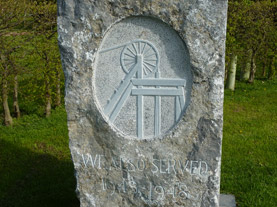Firstly Thank you for comments on yesterdays post.
My birthday month at WI so a birthday ‘posy’ which was really a lovely bunch of roses in a gorgeous colour.
Our speaker at WI this week was a lady telling us all about The Bevin Boys and especially about her father.
At the beginning of WWII much of the coal mined in this country was exported to Poland and Italy so the need for coal suddenly dropped as war started and therefore it was decided that miners wouldn’t be a reserved occupation and many went off to fight. (The government didn’t look very far ahead – just like nowadays!) But by 1943 the country faced a crisis as there was only 3 weeks of coal stock left. Of course this was at a time when coal was used for trains and power stations as well as homes. Winston Churchill gave Ernest Bevin, Minister of Labour and National Service the job of increasing coal production.
Bevin decided that one in ten of all conscripts between 18 and 24 drafted to serve would go down the mines. This was done by a random ballot and anyone who objected could be sent to prison.
The speakers father was a country boy, working on a farm, from south Suffolk who had hardly been out of the county but he was sent off to train for just four weeks on the Derbyshire coalfields along with many other boys from all walks of life.
The way these boys were treated was totally different to boys who went into the forces. They were given no special clothing, their pay was much lower too and only had one week off a year. Because they had nothing to say what their war work was many were treated badly by the public who thought they were conscientious objectors or shirkers.
At the end of the war they were forced to carry on until 1948 and their work was never recognised, they got no thanks, no demob suit and certainly no medals. The lady said some never mentioned what they did as they were ashamed that they hadn’t been abroad fighting for their country. They got no help from the British Legion and when mining was Nationalised all records of the 48,000 Bevin Boys was destroyed.
For 50 years they campaigned to take part in the Remembrance Day service at the Cenotaph and were finally allowed just a few years ago and also very recently they have a new memorial at the National Memorial Arboretum for those who died.
There are only a few men left who were Bevin Boys – all in their 90’s – including the speakers father. But by talking about them to various groups around the country and having all the information available via The Bevin Boys Association they keep their stories alive.
Back Tomorrow
Sue

